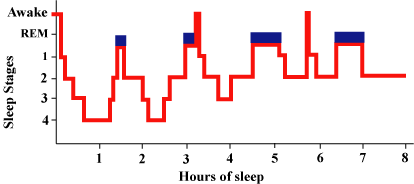 |
Short and deep sleeping method
|
Cat: ICT |
Kenko Fujimoto (藤本憲幸) |
07315u/18123r |
Index
Why?
- is eight-hours sleeping really necessary and sufficient for a
human being?
- This book explains how to get short and deep sleeping method,
which can even activate 100% of brain and body.
- Also this describes quantity of sleep equals time of sleep multiplies
depth of sleep, including various themes about modern sleeping and
related issues.
- 8時間の睡眠は本当に必要で十分なことなのだろうか?
- 本書は、短くかつ深い睡眠法がどうしたら得られるかを述べている。それによって100%頭と身体が活性化することが可能であるとしている。
- 睡眠の量とは、睡眠時間×睡眠の深さという。その他、現代の睡眠と関連事項について書いている。
Key
Phrase
キーフレーズ
>Top
0. Three hours deep sleep is enough?:
- Eight hours sleeping is not a common sense!
- According to a clinical test, three consecutive all nights
and then ten hours sleep can recover normal situation.
- Less than 8 hours sleep may only cause some kinds of discomfort
feeling lack of sleeping or discontent about sleeping more.
- Rather, inability of deep sleeping requires longer sleep.
- Quantity of sleep = sleep time x sleep depth
- Material of cause of fatigue:
- Gammahydroxybutyric acid;
- which is produced by daily brain activity, which requires sleep
to eliminate such acid
- In order to get deep sleep;
- easier way is to make an effort to sleep as less as possible,
and change into the rhythm for deep sleep.
- Too much sleep makes brain and body duller.
- longer sleep makes our body inactivate, causing to continue
lower function of motor nerve (like bone fracture)
- Shorter sleep like 6 hours is effective in recovering health.
- Longer sleep make shallow breathing, causing exygen-poor situation
inside the body.
- Utility of shorter sleep:
- Concentration power
- Not giving brain cells too much rest
- Don't take ineffective energy. Excessive energy may cause mental
instability and further drowsiness
- Decreasing burden of internal organs.
0.
三時間の熟睡習慣で十分か?:
- 8時間睡眠は常識ではない!
- 臨床試験によれば、三日の徹夜の後10時間の睡眠で通常の状態に戻る。
- 8時間未満の睡眠は寝不足と思う不快感やもっと眠りたいという不満感が残るだけ。
- むしろ熟睡できないことが長時間睡眠が必要になる。
- 睡眠量=睡眠時間×睡眠の深さ
- 疲労の原因物質:
- ガンマハイドロオキシ酪酸:
- これは毎日の大脳活動によって貯まる。睡眠によってこの酪酸の除去が必要。
- 熟睡をするために:
- 簡単な方法はなるべく眠らないようにして、熟睡のリズムに変えることである。
- 眠りすぎは頭も身体も鈍くなる。
- 長時間の睡眠は身体を不活性化し、運動神経も低下させる。(骨折も同様)
- 短い睡眠(6時間) は病気回復にも効果的
- 長い睡眠は、浅い呼吸となり、体内の酸素不足を生じる。
- 短い睡眠の効用
- 集中力
- 大脳細胞を休ませ過ぎない。
- 無駄なエネルギーを取らない。余分な縁は精神不安定にし、またさらに眠気を生じさせる。
- 内臓の負担を減らす。
>Top
1. To become a good sleeper:
- Sleep to rest brain, body and autonomic nerve system.
- cause of fatigue of body: lactic acid in muscle, which can
be derived by only lie-down.
- reticular formation (formatio reticularis): located throughout
brain stem, involved in stereotypical actions like walking,
sleeping and lying down.
- function like the center of arousal as well as dormition
- monotonous work, or hearing uninteresting story make sleepy.
- Essentials for brain and body:
- Oxygen: 20-25% of inhaled oxygen is consumed at brain.
(about 50% in case of children)
- The worst case is carbon monoxide
- High-quality protein: particularly glutamic acid
- Carbohydrate is necessary to decompose glutamic acid into gammaaminobutyric acid and gammahydroxybutyic acid.
- But brain and body compete to get oxygen and carbohydrate.
Thus excessive sports cause deficiency of nutrition in brain.
- Parasympathetic nerve controls sleep:
- Both nerve systems constitutes automomic nervous system, typicall
function in opposition to each other; homeostasis.
- Sympathetic nerve sytem:(like accelerator)
serves to accerates heart rate, constrict blood vessels, and
raise blood pressure.
- Parasympathetic nerve system: (like brake, called the rest
& digest system)
serves to slow heart rate, constrict pupil, dilate blood vessels,
increase intestinal and gland activity and relax sphincter musles.
- Sympatheitc division funcitons in quick response, but parsympathetic
division do not requrei immediate reaction.
1.
眠り上手とは:
- 頭脳、肉体、自律神経を休ませる睡眠
- 身体の疲労の原因:筋肉中の乳酸。これは横たわるだけで除去できる。
- 脳幹に散財する網様体:歩行、睡眠、横たわりなどに関与
- 覚醒センターであり睡眠センターの役割
- 単純作用や興味のない話は眠気を催す。
- 頭脳と身体の必需品:
- 酸素:取り込んだ酸素の20-25%が大脳で消費 (子供の場合は50%)
- 一酸化炭素は最悪
- 良質なタンパク質:特にグルタミン酸
- 炭水化物はグルタミン酸をガンマアミノ酪酸とガンマハイドロオキシ酪酸に分解するのに必要。
- 但し、頭と身体で酸素と炭水化物を奪い合う。つまり過度な運動は大脳の栄養不足になる。
- 副交感神経が眠りを支配:
- 交感神経と副交感神経は反対に機能して身体を一定に保つ (ホメオスタシス)。
- 交感神経:(アクセルの役割)
心拍数を上げ、血管を収縮して血圧を上げる。
- 副交感神経 (ブレーキの役割、別名、休息と消化のシステム):
心拍数を遅くし、瞳孔を縮小し、血管を拡張し、腸や腺分泌を活性化させ、胃壁の平滑筋を弛緩させる。
- 交感神経系は迅速に対応するが、副交換系は迅速には対応しない。
>Top 2. Mechanism of sleep:
- Cf. Sleep changes over the night (adult):
Source: The Karger Gazette - Apr. 1997

- Sleep cycle over a night is around 1.5 hours.
- There are two types of sleep: "Orthodox sleep, or NREM sleep'
and 'Paradox sleep, or REM sleep'
- REM = Rapid Eye Movement; NREM = non-REM
- Orthodox sleep (NREM sleep) shares 75-80% of the total sleep,
having following 4 stages:
- Stage-1 sleep: (initial sleep): somnolence, or drowsy sleep
- continues 2-3 minutes after entering sleep
- near-disappearnce of alpha wave (8-13Hz), and the first
time appearance of theta wave (4-7Hz).
- Stage-2 sleep: (shallow sleep)
: sleep spindles
- continues10 minutes.
- Conscious awareness of the external
environment disappear.
- Stage-3 sleep: with delta waves
- usually continues 20-30 minutes
- also called delta rhythm
(.5 - Hz)
- is considered part of slow-wave sleep (SWS)
- Stage-4 sleep: true delta sleep,
- continues 30-50 minutes
- the deepest stage of sleep. Sleep like a log.
- It is difficult
to wake up in this state.
- REM sleep (Paradox sleep):
This sleep shares about 20-25% of the total sleep. But bay until
6 months shares about 50%:
- occurs about 20 minutes after the Stage-4 sleep.
- sometimes include
beta wave (12-19Hz).
- popularly associated with dreaming.
- EEG looks similar to stage-1.
- REM sleep is thought of as 'an active brain in an inactive
body, where most dreaming occurs, with EEG is low voltage, mixed
frequency similar to the awake EEG.
- EEG = ElectroEncephaloGram
- Sleep cycle:
- Sleep cycle (orthodox sleep + REM sleep) is about 90 minutes.
Most people repeat this cycle four times a night, totaling
about 6-8 hours.
- REM sleep time elongates in repeating each cycle.
- comfortable wake-up is best just after the end of REM sleep. Thus 6 hours sleep is preferable!
- 6 hours sleep is composed of 4 sleep cycles.
- 3-4 hours sleep is better than 5 hours sleep in a similar
fashion.
2.
睡眠のメカニズム:
- 睡眠サイクルは1.5時間前後。これを一晩に4サイクル。
- 睡眠には2種類ある。ノンレム睡眠 (正睡眠)とレム睡眠 (逆説睡眠)である。
- レム睡眠は、不活性な身体で活性した脳の状態。多くは夢を見る。脳波は低電圧で、覚醒時と同様の混合波
- EEG = 脳波図
- 正睡眠(ノンレム睡眠):
以下4段階からなる。眠り全体の約75-80%を占める。
- 第1段階:入睡期
- 睡眠後2-3分の浅い眠り
- α波(8-13Hz) が消えてθ波(4-7Hz)が現れる。
- 第2段階:浅眠期
- 約10分続く
- 浅い眠り
- 第3段階:中等度睡眠期
- 20-30分続く
- δ波 (0.5 - 4Hz)リズム
- SWS (Slow-wave sleep)
- 第4段階:深眠期
- 30-50分続く
- もっとも深い眠り
- 丸太のような眠り
- レム睡眠:
全体の睡眠の約20-25%を占める。但し、乳幼児は50%も。
- 上記第4段階の正睡眠の後、20分後
- β波 (12-19Hz)を含む
- 夢を見るのはこの段階。大脳はいくらか覚醒しているあ、身体は完全に弛緩
- 眼球運動
- 正睡眠 (ノンレム睡眠)は大脳の眠りで、レム睡眠は身体の眠り
- 睡眠サイクル:
- 睡眠サイクル (正睡眠+レム睡眠)は約90分。ほとんどの人はこれを一晩に4回繰り返し、計6-8時間の睡眠を取っている。
- レム睡眠は、サイクルを繰り返す毎に少しずつ長くなる。
- さわやかな覚醒はレム睡眠の直後がいい。
→6時間睡眠の方がよい。
- 6時間睡眠は4回の睡眠サイクル
- 同様に、3-4時間睡眠にほうが5時間睡眠より良い。
- Secretion of hormone:
- Growth hormone (somatotropin) is usually secreted during sleep,
particularly REM sleep.
- The share of REM sleep:
- 0.5 year baby: 50% of 16 hours sleep.
- 1-year child: 40% of 13-14 hours sleep
- 4-year child: 30% of 11-12 hours sleep
- 7-year child: 25% of about 10 hours sleep
- 12-year child: about 20%; same as adult.
- 48 hour-cycle sleep:
- There are some people who spend 48 hour sleep such as railmen,
policemen, firemen, taxi drivers, nurse,
- They usually sleep 8 hours per two days and several naps.
- They need not sleep 14 hour per two days instead of 8 hours.
- Measures to insomnia:
- Gluttony, or heavy eating causes inertia of elongated sleep.
Weariness of inner organs requires sleep.
- Physical tiredness can be recovered only by closing eyes.
- Chinese herbal medicine may take effect.
- Tips for conquering insomnia:
- Mind control method; say, believe that time solves every
things, or wish what you can, don' wish what you can't.
- Feel relaxed by having light exercise.
- Take a lukewarm bath.
- Have a snack (sandwiches, sponge cake, etc.)
- Listen to light music
- When you can't sleep, read a book taking that opportunity,
or spend time in thought, or meditation.
- Don't store unnecessary energy; morning oversleep could be
expletive.
- ホルモン分泌:
- ホルモン分泌が盛んになるのは寝ている間、特にレム睡眠時である。
- 成長ホルモン (ソマトトロピン)は、通常は睡眠中、特にレム睡眠中に分泌される。
- レム睡眠の比率:
- 0.5 歳児:16時間睡眠中の50%
- 1歳児:13-14時間睡眠中のの40%
- 4歳児:11-12時間睡眠中のの30%
- 7歳児:10時間睡眠中の25%
- 12歳児:睡眠時間の約20%で大人と同じ
- 48 時間サイクルの睡眠法:
- 鉄道員、警察官、消防員、タクシー運転手、看護師など48時間睡眠サイクルを送っている人がいる。
- 彼らは、通常2日に一度8時間睡眠し、何回か仮眠する。
- 2日に一度の睡眠は8時間の代わりに14時間する必要はない。
- 不眠症対策:
- 大食は惰眠の原因となる。
- 疲労は目を閉じるだけでも効果がある。
- 漢方薬も効果がある。
- 不眠症対策法:
- マインド・コントロール法:時間がすべてを解決すると思うこと。できることを望み、できないことは望まないこと
- 軽い運動でリラックス
- ぬるめの風呂
- 軽食 (サンドイッチ、カステラ)
- 軽音楽
- 眠れない時は、それを機会に読書、考え事、瞑想する
- 余分なエネルギーを貯めない。朝寝は付け足しである。
>Top 3. Refreshed awakening:
- Compressed and effective sleep:
- Neither length nor depth, but density of sleep matters.
- Here, density means proper posture, correct breath, and
deep sleep, not giving irregular pressure to inner organs
and neck.
- Ideal sleep can only available by the situation of no-stress
, balanced physical fatigue, and no diseased feeling at
the inner organs.
- In order to get deep sleep, we must keep rest for brain,
body, and inner organ.
- Keep hour of wake-up constantly, though any time you go to bed.
- Have a clear image of particular time of wake-up.
- If feel sleepy, only 5-minutes-nap is effective.
- Take alkaline foodstuffs to maintain blood pH 7.4.
- Such as milk, egg albumen, soy bean, spinach, radish, orange,
seaweed, dried kelp, small fry, and brown rice.
- Minimize meat and sweetness intake.
- Smoking and excessive alcohol is hopeless.
- Keep normal walking with goof posture.
- Various methods for deep sleep:
- One meal a day is enough
- Be a small eater for deep sleep
- Keep smooth circulation of the blood by small eating.
- Make longer time of feeling hungry.
- Ready to be active within 10 minutes after wake-up.
- Be a frequent laughter.
- Yarning is a magic bullet to turn off drowsiness.
- Good start for business:
- Deep breath after wake-up
- One-hour-reading at early morning.
- Early-morning study is much more effective than late-night
type.
- Warming up brain to be ready for better creativeness, judgment,
analysis, foresight, brainstorm, adaptability as well as memory.
- Keeping an all-ngiht vigil on rare occasions:
- To make starving hungry for sleep.
- But continue being awake more than 36 hours.
3. さわやかな目覚め:
- 圧縮睡眠:
- 睡眠は、長さでも深さでもなく密度が重要である。
- 密度とは、正しい姿勢、正しい呼吸、そして内蔵や首に負担をかけない熟睡である。
- 理想的な睡眠は、ストレスがない状態、バランスのとれた身体的疲労、そして内臓の状況がよいことが必要。
- 熟睡するためには、頭脳、身体、内臓を休めなければならない。
- 何時に床についても、起床時間は一定にする。
- 起床時刻を明確に意識する。
- 5分間の仮眠の効用
- アルカリ食品を食べて血液のpH 7.4を維持。
- 牛乳、卵白、大豆、ほうれん草、大根、蜜柑、海苔、ひじき、昆布、小魚、そして玄米
- 肉と甘味の摂取を控える
- 喫煙は厳禁
- 正しい姿勢での歩行
- 熟睡のための方法:
- 一日一食でよい:
- 熟睡のためには小食
- 小食によって血行をよくする。
- 空腹を感じる時間を長くする。
- 起床後10分以内に活動する準備をする。
- よく笑うこと
- あくびは眠気を追いやる特効薬
- ビジネスのための好スタート:
- 起床後の深呼吸
- 早朝の1時間読書
- 早朝学習の方が夜更かし型より遙かに効果的
- 大脳のウォーミングアップによって、より良い創造力、判断力、分析力、先見性、発想力適応性、そして記憶力を発揮する。
- たまに徹夜をすること:
- 睡眠のための飢餓状態を作る
- 但し、36時間以上は起きていること
Comment
- Is eight-hour-sleep a superstition?
- If we could achieve effective deep sleep with shorter time, we
could live longer and spend for more valuable things.
- Torrerance to drowsiness has been one of my confidence since
high school days.
- 8時間睡眠は迷信なのか?
- もしもっと短時間で熟睡ができるならば、我々は長生きすることになり、貴重なことに時間を割ける。
- 眠気に耐えることは高校時代からの私の自信の一つであった。
Index |
||
Why? |
|
|
Key Phrase |
キーフレーズ |
>Top 0. Three hours deep sleep is enough?:
|
0. 三時間の熟睡習慣で十分か?:
|
>Top 1. To become a good sleeper:
|
1. 眠り上手とは:
|
>Top 2. Mechanism of sleep:
|
2. 睡眠のメカニズム:
|
|
|
>Top 3. Refreshed awakening:
|
3. さわやかな目覚め:
|
Comment |
|
|